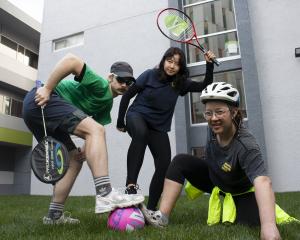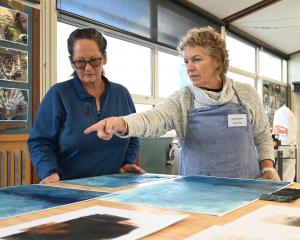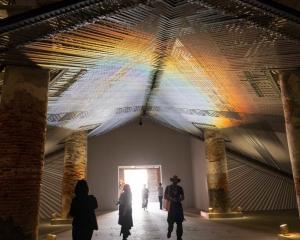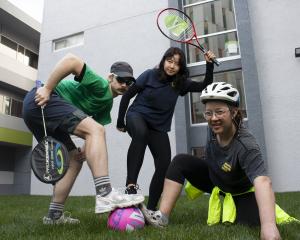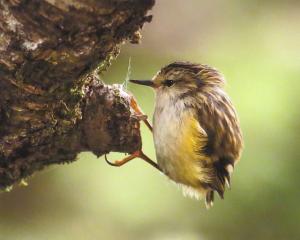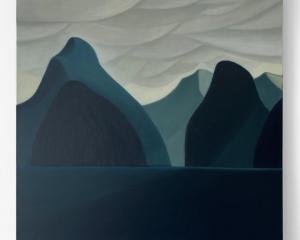Rodrigo's Concierto de Aranjuez, one of the most famous guitar concertos, will be performed this weekend by Karin Schaupp with the Southern Sinfonia. Charmian Smith talks to the Australian guitarist.
''I'd heard her play a lot and I'd heard her pupils play and I always loved the tone of the guitar. It's lyrical, although I wouldn't have described it as that when I was 3. I loved the gentle nature of the sound of it. I wanted to be able to make that sound myself. I wanted to do what Mummy did,'' the German-born Australian guitarist said.
''I think teaching your own child and having that dual role of mother and teacher is very difficult, very challenging. She passed away last year but I would have to say we were very close and I'm infinitely grateful for what she taught me.''
Her mother was her main teacher and, later, her producer, and despite having other teachers and influences as she got older, Karin always ran things past her mother. Despite ups and downs, they were very close, she said. The guitar is not only the most popular instrument in the world, it's also extremely versatile because it can be played in so many different styles, and Schaupp does, among them Brazilian jazz, early music and popular music.
''The sound has a very vocal quality. There's something about it that reminds us of the human voice. It's a very emotional instrument: it can be lyrical; it can be very fiery; you can accompany yourself; you can play a melody and an accompaniment at the same time. The melody can sound quite vocal and the accompaniment can be harmonic or rhythmic or whatever you want. It's a unique instrument, difficult to play and a difficult instrument for composers to write for, as it's incredibly idiomatic,'' she said.
''I think one of the challenges is convincing composers to have a go at writing for the guitar even when they don't play the guitar. There are long periods of history where composers who didn't play the guitar didn't write for it.''
She thinks players such as Andres Segovia (1893-1987) who brought the guitar to the concert stage made people take it more seriously as a concert instrument. Earlier guitars were soft parlour instruments with the bass and top notes louder than the middle ones, but in the past 30 years guitars had changed and become louder, with more colour and balance across the range, she said.
Although she has a replica early-19th-century guitar, in concert she plays a modern instrument made by Australian Jim Redgate that has a wave-shaped top for resonance.
Even so, for the concert she will be amplified, as otherwise the guitar will not be heard against the orchestra.
''I have actually played the Rodrigo without amplification quite a long time ago. I found it not a satisfying experience for me or the audience or the orchestra. The orchestra had to whisper and I had to play three volume levels above what I wanted to be playing, and the audience still couldn't hear the details. You might hear the notes but you wouldn't hear the nuances, especially in the tender second movement.''
The second movement of Concierto de Aranjuez is a beautiful, slow lyrical piece that often makes it into the top 100 most loved classical pieces, she said.
It was influenced by the death of the composer's baby and is full of drama and pathos, ending apparently with the soul of the baby ascending to heaven with high harmonics on solo guitar. It is framed on each side by two fast movements, the first very fiery and Spanish, and the last a light dance that is probably one of the most difficult pieces in the guitar repertoire, she said.
Schaupp made her professional debut playing this concerto with the Brisbane Philharmonic at the age of 19 and has played it many times since, including with the Southern Sinfonia in August 2004. However, they way she plays it has changed over the years.
As you progress as a musician, you become a more nuanced player. When she was younger she usually sounded as if she was in a rush, she said.
''I'm a very different musician, a different person too, from what I was 20 years ago. I've lived a lot more life, had children, lost both parents, experienced a lot more, travelled round the world - there's a lot of life experience since the teenager who was still at university. I understand the piece in a different, deeper way. It's a very challenging piece to play, one of the most difficult in the repertoire, but it's much easier now than it was 20 years ago.
''I feel I understand the music - not that I felt I didn't understand it then. I think especially the second movement, which apparently is very much about loss - it's very yearning, lyrical and beautiful, but sad, and you can't really feel it or express that in music unless you've experienced it.''
About 13 years ago, Schaupp took up acting for fun, something she hadn't had a chance to do before.
''I really enjoyed it and realised it was having a big impact on how I was performing on stage. Obviously all the non-musical aspects, but also the way I played and the need to open and the freedom I felt, so I started taking private acting lessons and thought this was something I might like to incorporate into my performance career.''
Australian playwright David Williamson wrote Lotte's Gift for her, a one-woman play based on the story of three generations of inspiring women and the music in their lives: Schaupp herself, her mother and grandmother. Schaupp wrote the music and has performed it more than 150 times around Australia.
''It's very powerful to be able to combine the two languages because particularly instrumental music is very abstract and words are very direct, but I think you can say things in the two languages that complement each other and actually deepen each other. I found this in Lotte's Gift. The moments the audience was moved to tears were during the musical pieces, but that was only because the lead-up to those musical pieces was a story that people could relate to. Had I just sat down and played a concert of those musical pieces, it may not have had the same impact,'' she said.
She continues to combine music and spoken words in some of her projects.
Until about 10 years ago, she focused on playing solo, then she started collaborating, first with other guitar players, then with other instruments, then with people in other styles of music, and now she is excited by working with people outside music.
The recipient of an Australia Council fellowship, she is working on projects to create a new platform for classical music, including with Topology, a post-modernist quintet that creates original work across genre boundaries, and with percussionist Claire Edwardes.
See it, hear it
The Southern Sinfonia, conducted by Kenneth Young, gives the first of its matinee series concerts this Satruday at 5pm and Sunday at 3pm at the King's and Queen's Performing Arts Centre in Bay View Rd, Dunedin. They will perform Mendelssohn's The Hebrides Overture, Butterworth's The Banks of Green Willow, Rodrigo's Concierto de Aranjuez with Karin Schaupp on guitar, Kenneth Young's Douce Tristesse and Mozart's Symphony No 39.


